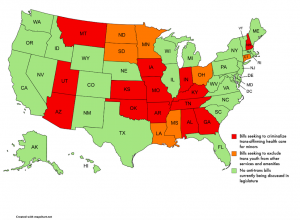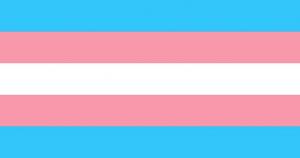What’s Going On?
A lot of you have probably heard about the bill that just passed in Arkansas, banning all transgender-affirming medical care for minors. (It passed despite a surprise veto from the governor; he pointed out, rightly, that there was nothing “small-government conservative” about making more laws restricting the freedom of parents and doctors dealing with trans-identifying kids.) What’s not so well known is that this is just one of dozens of bills from all over the country, doing everything from keeping trans students out of school sports programs to mandating prison sentences for doctors who prescribe medications like puberty blockers or hormone replacement therapy.

EDIT: I don’t know if the sources I was relying on were incomplete, or if anti-trans legislation is just being introduced that fast, but this map is out of date. North Carolina should be red, and Florida, Pennsylvania, and West Virgina should all be orange as well. Also, if the key isn’t legible: red states are considering or have passed bills banning trans-affirming health care for minors; orange states are considering or have passed bills that ban trans-identified minors from certain gendered services and amenities (e.g. single-sex bathrooms, school athletic teams); green states (except the corrections I listed) are not currently considering new anti-trans legislation.
A lot of Catholics are happy about this. I’m very much not.
So … What’s Going On?
As a rule, I find that very few Catholics have any clear grasp on what trans identities even are—more so than gay or lesbian identities, even. Of course, being able to understand something doesn’t mean you agree with or approve of it, but it’s arrogant and foolish to reject something without understanding it.
Now, I’m not an expert on trans issues, and different people explain them in different ways. I tried to write an introduction to the subject a few years ago myself. I think I would still stand by most of what I said; you’re welcome to read that series if you’re interested, or, better yet, to seek out trans sources who can speak for themselves, like Natalie Wynn or Abigail Thorn. I’d also suggest this article by Daniel Walden in Commonweal from last month, which introduces the subject from a theological and philosophical perspective.
Because I want to keep this post brief—or at least manageable—I’m not going to give a new primer of my own at the moment. Instead, I want to focus on a few serious misconceptions that a lot of Catholics have about transgender people and trans issues, because these misconceptions can seriously endanger trans people. (This isn’t an exhaustive list, you understand, just some of the hits.)
Misconception #1:
“Trans-affirming health care” is a euphemism for giving sex changes to teenagers.
No. Calm down. “The surgery,” as it is charmlessly called, is only one form of trans-affirming health care, and it isn’t what’s usually under discussion when we’re talking about minors. What’s chiefly at stake here are two kinds of medication: puberty blockers, and hormone replacement therapy or HRT. Gender reassignment surgery on minors is, to my understanding, not at all common—but if that’s something you’re deeply concerned about, then I suggest you take a look at #3 below.

The reason these treatments are given at all is to deal with what’s called gender dysphoria. Gender dysphoria is a form of intense psychological discomfort with one’s physical sex; it may be focused on primary sex characteristics (genitals), secondary traits (facial and body hair, voice, skin texture, etc.), or both. The reason doctors are treating this in the first place is that gender dysphoria is strongly correlated to suicide, and trans-affirming health care is, as far as current research shows, the only thing that lowers that risk. Put bluntly, making trans-affirming health care more difficult or even impossible to access is, in practice, going to kill people.
Misconception #2:
Puberty blockers are a new, experimental treatment being tested on kids.
Puberty blockers delay the onset of puberty. They were originally designed to delay what’s called precocious puberty, one that starts before a child’s body is ready to develop (e.g. around 8 or 9 years old). While the child takes blockers, puberty doesn’t happen, but everything else continues normally. Once the child stops taking blockers, puberty resumes. They’ve been around since the 1980s, and they’re completely safe and reversible—that was kind of the point.
Doctors sometimes prescribe puberty blockers to minors who are questioning their gender (or already identify as trans), so that the child can have more time to mature and reflect before making a decision about their gender identity that’ll have long-term consequences. Some go on puberty blockers, and then determine that their sex at birth is indeed who they are; they go off blockers and have a normal, if late, puberty. Others persist in a transgender identity, and pursue further medical interventions, such as HRT and sometimes surgeries.
This—this reversible, safe, medically standard treatment—is one of the main things these bills are banning. As in, children can’t get them even with their parents’ consent. With some bills, even trans kids who’ve been on these medications for years can’t continue to get them, which may mean being involuntarily outed as trans: people notice if a seventeen-year-old they’d assumed was a boy starts developing breasts. And neither high school nor the world in general is kind to trans people, or even people who just look weird.
Misconception #3:
Biological sex is always clear from birth, but gender ideology tries to destroy this.
First of all, despite the fact that many highly-placed clergy have used the phrase, “gender ideology” doesn’t seem to have any clear definition, so let’s get one of those before we start throwing it around. What is “gender ideology”? What views does it consist in? What are the sources that state these views? Which, if any, of these views conflict with the Catholic faith, and in what ways?

All that aside. There is a set of medical conditions known collectively as intersexuality, in which a person’s physical sex shows both male and female characteristics. Sometimes, these traits are mixed to the point that it’s not clear which sex predominates (what used to be called hermaphroditism, though this word isn’t considered appropriate today). There are a few different forms of intersexuality; we don’t need to get into them here. The point is, even if we reject all trans identities—something we should not do without taking the trouble to understand them first, remember—it’s still just not true that physical sex is always obvious.
But you know what’s almost always done to “treat” intersexuality, no matter how harmless it is? That’s right, surgery. And you know how old the patients of these surgeries typically are? Infants. If you have a problem with surgical interventions for trans teenagers, you should have a problem with this too!
Misconception #4:
Trans people need counseling to accept the body they were born in.
We’ve tried that. It doesn’t work.
Yes, this is an oversimplification—but not by much. Some people question their gender for a while, but then settle into their birth sex; some people experience only mild dysphoria, and choose to cope without pursuing gender transition. But many trans people’s dysphoria is too extreme for that to be a livable solution. And, not unlike homosexuality, people have been trying to “cure” dysphoria for decades, and it has proven famously intractable to all kinds of treatments and theories. The only thing that is known to relieve the distress of gender dysphoria is transition, which normally includes things like HRT at the very least (another thing these bills target). At the risk of sounding like a bad culture warrior, trans people’s lives are worth that.
And just think about it. If you had a secret that you knew people would despise you for and that, literally, kept you from feeling comfortable in your own skin, wouldn’t your first choice be to try to be normal? Do you seriously believe that “accepting the body they were born in” just hasn’t occurred to trans people? That they haven’t tried it? Transition risks every relationship you have, and typically costs tens of thousands of dollars to boot. People aren’t doing this as a lark.
Saint Marina the Monk, Pray for Us

To the best of my knowledge, the Church has not as yet made a dogmatic pronouncement on what constitutes a person’s gender. Still less has she declared that trans identities are invalid, or that getting trans-affirming health care is a sin. I’m not saying this proves trans identities are valid; frankly, I recommend a cautious agnosticism on the whole subject. I think Catholics are much too eager to pretend the Church has defined things when she just hasn’t, because it would score points against political enemies. And as if that weren’t enough, Catholics often attack transgender people not only in the abstract, but with direct personal cruelty. I don’t have any sympathy with that. That kind of contempt for the image of God in trans people is a sin.
St Marina the Monk lived as a man for many years. When her father retired to a monastery, she went with him, disguised as a man; after his death, she continued living as a monk. She was falsely accused of fathering a child with an innkeeper’s daughter; she did not defend herself, and the abbot imposed heavy, lifelong discipline on her as penance. When she died and her body was taken to be washed before burial, the other monks discovered she had been born a woman, and the whole monastery repented bitterly for believing the false accusation against her and for mistreating her.
Was St Marina a trans man? Probably not; trans people only make about about two percent of the population, so the odds are low. But she obviously had reason to understand a lot of the experiences trans and gender-nonconforming people go through—up to and including being misunderstood, slandered, and unjustly punished for things she didn’t do. I have a feeling she looks after trans people.
And whether she in particular does or not, we know God treasures trans people. He made them. And he is love.












